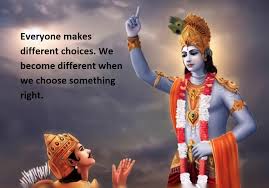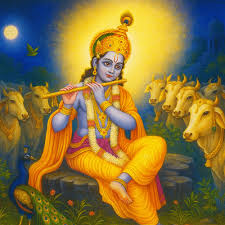
How to Make Right Decisions Without Hurting Anyone: Bhagavad Gita Wisdom
Life constantly places us in situations where we must make choices—some small, some life-changing. Yet one of the biggest challenges is making the right decision without hurting others. Often, we find ourselves torn between personal interests, family expectations, professional obligations, or societal norms. In such moments, timeless wisdom from the Bhagavad Gita can serve as a guiding light. This ancient scripture offers practical lessons on decision-making, self-clarity, and balanced living that remain relevant even in today’s fast-paced world.
Understanding the Dilemma of Decision-Making

Most people struggle with decisions because they fear the consequences—losing relationships, causing pain, or facing regret later. The Bhagavad Gita opens with such a dilemma: Arjuna, a warrior prince, stands on the battlefield of Kurukshetra, unwilling to fight against his own family members, teachers, and friends. His heart is full of doubt, guilt, and confusion.
In response, Lord Krishna imparts wisdom that transcends religion—it’s about life itself. He teaches Arjuna how to act with clarity, detachment, and righteousness. These lessons are just as applicable to us today when we face tough decisions.
Key Bhagavad Gita Principles for Making the Right Decisions
1. Clarity of Purpose (Dharma)
The Gita emphasizes acting according to one’s dharma—our duty, purpose, or moral responsibility. Before making any decision, ask yourself:
- Does this align with my values?
- Is this action fulfilling a responsibility or just feeding personal desire?
When decisions are based on dharma, they are less likely to harm others because they come from a place of fairness and responsibility, not selfishness.
2. Detachment from Results
One of the most famous verses from the Bhagavad Gita says: “You have the right to perform your duty, but not to the fruits of your actions.”
This principle teaches us to focus on doing the right thing without obsessing over outcomes. When we act with honesty and integrity, the result naturally follows. Detachment reduces fear, guilt, and overthinking, helping us choose wisely without being paralyzed by “what ifs.”

3. Control Over Emotions
Decisions made in anger, fear, or greed often hurt others. The Gita advises cultivating a balanced mind—remaining calm in both success and failure. Before making a tough choice, pause and reflect:
- Am I reacting emotionally or responding thoughtfully?
- Will this choice still feel right tomorrow?
Practicing mindfulness and emotional balance ensures that decisions are fair and considerate.
4. Selflessness Over Ego
The ego often clouds judgment—making us want to win arguments, prove superiority, or protect our pride. Krishna teaches that wise decisions arise when we let go of ego and act selflessly. Ask: Does this decision serve only me, or does it benefit others as well?
Selfless decisions may not always be easy, but they create harmony and reduce conflict.
5. Consultation and Inner Reflection
The Gita highlights the importance of seeking wisdom. Arjuna turned to Krishna for guidance. Similarly, we can consult mentors, spiritual texts, or trusted loved ones. At the same time, silence and meditation allow us to connect with our inner voice.
Combining external advice with internal reflection helps us arrive at balanced choices.
Practical Steps to Apply Gita’s Wisdom in Daily Life

- Pause Before Acting – Whenever you feel pressured, step back. Even a few minutes of reflection can prevent impulsive decisions.
- List the Consequences – Write down how your choice may impact you and others. Choose the path with the least harm and greatest balance.
- Practice Gratitude – A grateful mindset reduces selfishness and helps you make decisions with kindness.
- Think Long-Term – Short-term benefits may harm relationships or peace of mind. Long-term, dharma-aligned decisions create lasting harmony.
- Meditate Regularly – A calm mind is less likely to make rash choices. Daily meditation sharpens clarity and self-control.
Real-Life Example
Imagine you are offered a high-paying job abroad, but accepting it means leaving your aging parents alone. The dilemma is clear: financial growth vs. family responsibility.
- If you follow desire alone, you may take the job but later feel guilty.
- If you blindly sacrifice your career, resentment may grow.

Applying the Gita’s wisdom:
- Check your dharma: Is your primary duty right now toward your parents or your career?
- Detach from results: Focus on the right action, not just salary or social approval.
- Balance ego and selflessness: Consider solutions like remote work, relocating parents, or ensuring proper care.
This way, the decision comes from responsibility, not impulse—minimizing harm to anyone involved.
Conclusion
The Bhagavad Gita teaches that the art of decision-making lies not in avoiding all pain but in choosing with wisdom, balance, and responsibility. By focusing on dharma, detaching from outcomes, keeping emotions in check, and acting selflessly, we can make decisions that are both right and kind.
Every decision may not please everyone, but when guided by inner clarity and higher values, it leads to peace—for us and those around us.
In today’s world of endless choices, let the Gita remind us: right decisions are not about avoiding conflict, but about acting with truth, compassion, and responsibility.
For the Latest Jobs Notifications: Click Here
Join With Us On WhatsApp: Click Here
Join With Us On LinkedIn: Click Here
Free Python Learning: Click Here